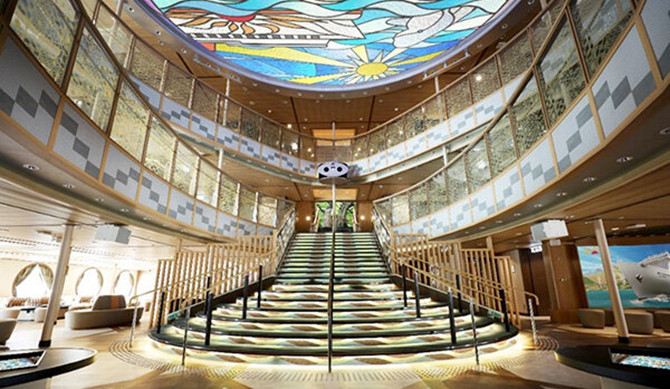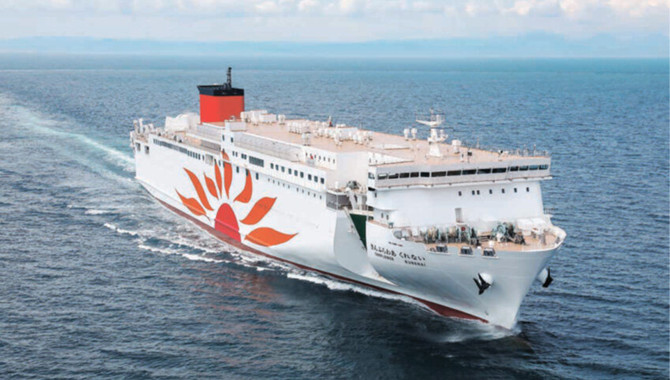TOKYO-Mitsui O.S.K. Lines, Ltd. today announced that the first of Japan's first two LNG-fueled ferries, the Sunflower Kurenai, owned by MOL and operated by its group company Ferry Sunflower Co., Ltd. entered service on January 13. The ferry serves the Osaka-Beppu route between Sunflower Ferry Terminal and Beppu International Tourist Port as a replacement for the ferry Sunflower Ivory.
Compared to earlier ferries, the new ferry offers greater transport capacity and convenience for both cargo and passenger transport. In freight transportation, it has greater capacity to load trucks and provides a larger, more comfortable room for truck drivers. In addition, the floor area of the Grand Bathroom is doubled and the number of seats in the restaurant was enlarged 1.5 times, and spacious and open public areas including a three-layer atrium were newly created. The new vessel is intended to promote and enhance the company's "Casual Cruise Concept".

It is Japan's first ferry to adopt the latest environmental-friendly specifications including a high-performance dual-fuel engine, which can run on both LNG and heavy fuel oil. The use of LNG fuel is expected to reduce emissions of carbon dioxide (CO2) by about 25%, and sulfur oxide (SOx) by virtually 100%.
The MOL Group set the target to achieve net zero GHG emissions by 2050 in the "MOL Group Environmental Vision 2.1" established in June 2021, and it is promoting the wider adoption of LNG fuel through development and advancement of an LNG fuel supply system in Japan and overseas.
In the ferry business, MOL has already ordered four LNG-fueled ferries, including the vessel. Following the Sunflower Kurenai and the Sunflower Murasaki, the first and second LNG-fueled vessels operated by Ferry Sunflower, the company plans to build two state-of-the-art LNG-fueled ferries and put them into service in 2025 to replace vessels currently plying the Oarai-Tomakomai route operated by MOL Ferry Co., Ltd.
MOL will further expand the adoption of LNG-fueled vessels, accelerate its efforts to reduce total greenhouse gas (GHG) emissions, and contribute to the realization of a low-carbon, decarbonized society through the concerted efforts of the entire Group.
Source: MOL
The opinions expressed herein are the author's and not necessarily those of The Xinde Marine News.
Please Contact Us at:
media@xindemarine.com



 Ningbo Containerized Freight Index Weekly Commentar
Ningbo Containerized Freight Index Weekly Commentar  Ningbo Containerized Freight Index Weekly Commentar
Ningbo Containerized Freight Index Weekly Commentar  Ningbo Containerized Freight Index Weekly Commentar
Ningbo Containerized Freight Index Weekly Commentar  BIMCO Shipping Number of the Week: Bulker newbuildi
BIMCO Shipping Number of the Week: Bulker newbuildi  Ningbo Containerized Freight Index Weekly Commentar
Ningbo Containerized Freight Index Weekly Commentar  Ningbo Containerized Freight Index Weekly Commentar
Ningbo Containerized Freight Index Weekly Commentar